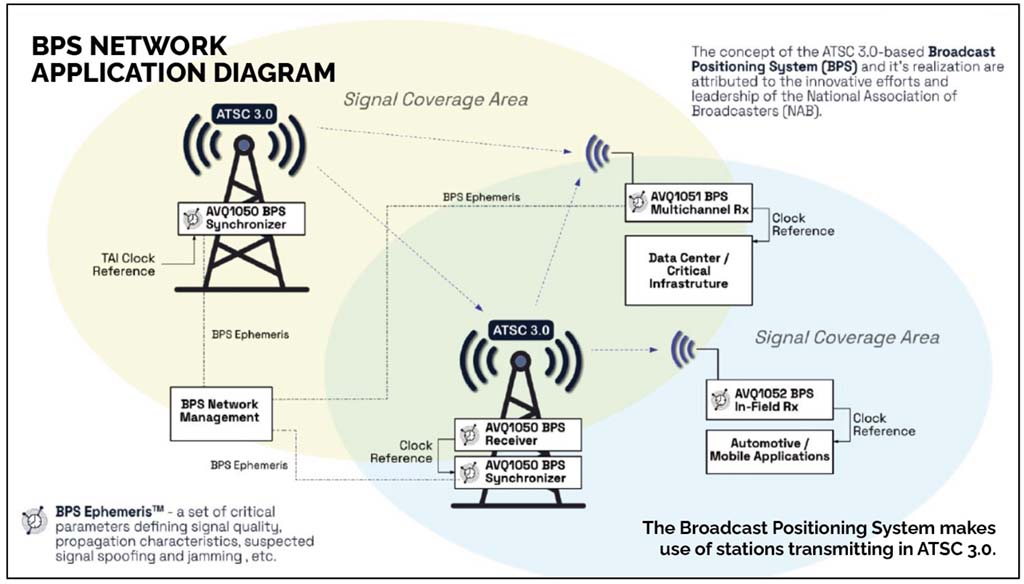NAB Wins Federal Contract to Evaluate Broadcast Positioning System
As part of an effort to create resilient alternatives to GPS, the $744,000 DOT contract will fund field testing of a positioning system using NextGen TV broadcasts

The professional video industry's #1 source for news, trends and product and tech information. Sign up below.
You are now subscribed
Your newsletter sign-up was successful
WASHINGTON—In a development that could boost interest in the NextGen TV broadcast standard, the U.S. Department of Transportation (DOT) has awarded the National Association of Broadcasters a $744,000 contract to advance field testing of the Broadcast Positioning System (BPS).
BPS is a new technology that was invented and developed by the NAB. Broadcasters have been promoting the system, which uses NextGen TV/ATSC 3.0 broadcasters, as a potential complement to existing GPS systems.
The NAB is partnering with Dominion Energy for the contract and the field testing.
This first-of-its-kind field test is part of a broader federal effort to develop resilient alternatives to GPS for position, navigation and timing services. By exploring multiple backup systems, the government aims to ensure the U.S. can continue to operate safely and securely if GPS is compromised, NAB said.
BPS uses NextGen TV (ATSC 3.0) broadcast signals to deliver highly accurate timing information to keep energy, financial and transportation systems running even if GPS is compromised. The NAB argues that this extra layer of security can help protect public safety and the nation’s critical infrastructure.
Experts at the National Institute of Standards and Technology (NIST) have said BPS performance is “comparable to or better than” GPS, the NAB reported.
“NAB is honored to receive this contract to advance BPS, affirming the vital role of broadcast technology in protecting our nation’s infrastructure,” NAB president and CEO Curtis LeGeyt said. “To fully realize the potential of this technology, we must achieve a nationwide transition to ATSC 3.0. We look forward to working with policymakers on a smooth transition, and to strengthening public safety and national resilience."
The professional video industry's #1 source for news, trends and product and tech information. Sign up below.
As part of the contract, NAB and Dominion Energy will serve as core partners in a real-world field trial to deploy and evaluate BPS. Dominion brings essential expertise as a critical infrastructure provider, helping to assess how BPS can bolster the resilience of the electric grid and other key systems.
“With this field trial, we are further demonstrating how free, over-the-air broadcasting continues to serve the public in new and indispensable ways,” LeGeyt said. “We are grateful to the DOT and the Volpe Center for recognizing the potential of our BPS technology to support national security, public safety and transportation innovation.”
In announcing the contract, the NAB noted that GPS is the backbone of navigation and timing for everything from airplanes to hospitals, but it is vulnerable to jamming and spoofing. BPS is designed to complement and backstop GPS by using high-power, frequency-diverse broadcast signals to deliver precise and traceable time. Unlike satellite or internet-based systems, it operates independently and can serve an unlimited number of users at once.
This makes BPS a scalable and infrastructure-resilient solution that can support critical timing needs across public safety, national security and essential services like the electric grid, the NAB noted.
With ATSC 3.0 signals already reaching more than 75% of U.S. households, broadcasters are well-positioned to provide a GPS-independent safety net that ensures Americans stay connected during emergencies and keeps vital systems running securely.
Click here to learn more.
George Winslow is the senior content producer for TV Tech. He has written about the television, media and technology industries for nearly 30 years for such publications as Broadcasting & Cable, Multichannel News and TV Tech. Over the years, he has edited a number of magazines, including Multichannel News International and World Screen, and moderated panels at such major industry events as NAB and MIP TV. He has published two books and dozens of encyclopedia articles on such subjects as the media, New York City history and economics.

